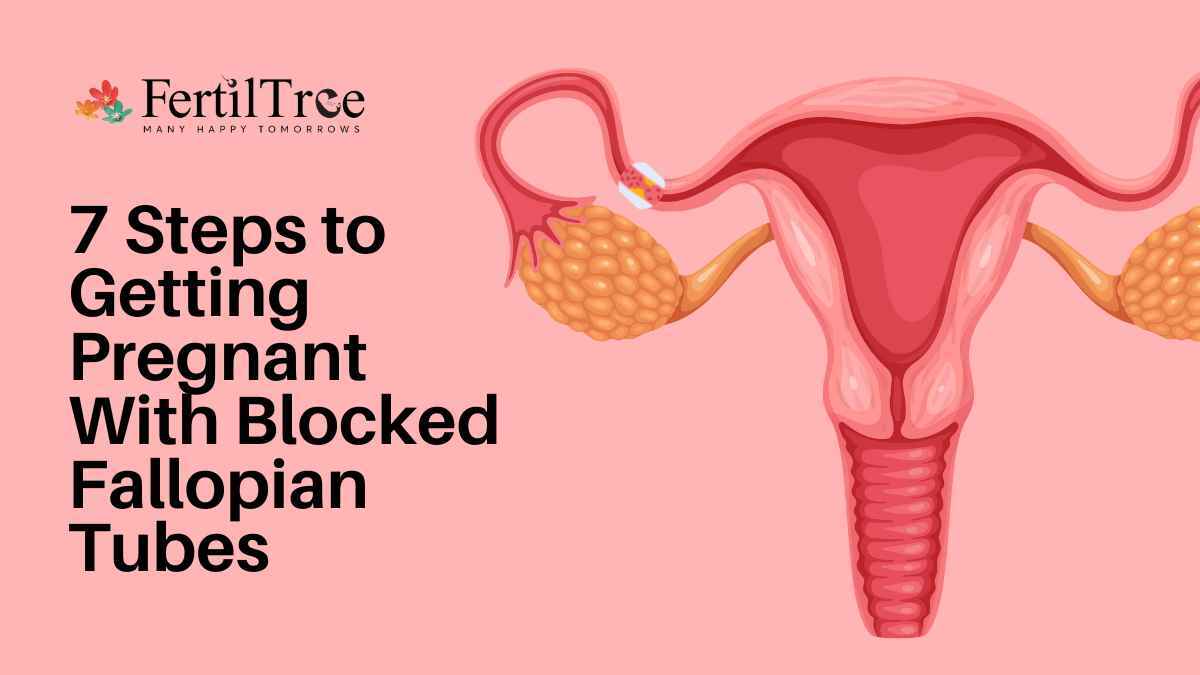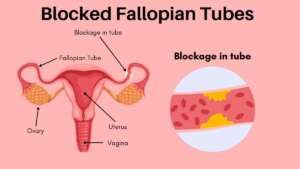
Fallopian tubes are two tubular structures originating from the upper part of the uterus. A healthy fallopian tube is 10–13 cm long and is a curly organ. It is equipped with Celia and muscles which allow contraction and relaxation of the tubular wall, thus permitting the movements of the egg and the sperm so that they can meet inside the fallopian tube and the sperm can fertilise the egg. The end of the fallopian tube has an opening and tentacle-like projections called fimbriae to surround the egg as it is released from the ovary and directs the egg into the recesses of the fallopian tube. In this blog we’ll talk about the causes, symptoms and signs of blocked fallopian tubes, as well as your chances of getting pregnant with this issue.

Blocked fallopian tubes and infertility
Blockage of the fallopian tubes causes an obstruction to the passage of the egg and the sperm. This, therefore, prevents fertilisation from occurring and also prevents the embryo thus formed from moving into the uterine bed, which is the place where the embryo implants.
Fallopian tubes are the essential organs that are required for fertilising the egg with the sperm and also for the transit of the embryos from the fallopian tubes to the uterine bed or lining.
An ectopic pregnancy is when a pregnancy implants in a site other than the uterine bed or lining. The common sites are the fallopian tubes and the cervix. The uncommon sites are the cervix and the ovaries. Sometimes the embryo may implant in the intestines, the liver or some other pelvic or abdominal organs.
Can you get pregnant with one blocked fallopian tube?
Yes, you can get pregnant in case you are born with one fallopian tube.
However if her fallopian tube is blocked due to disease, infection or inflammation, it is possible that the other fallopian tube is also blocked. If one tube is cut or ligated, then the other tube may be patent. In that scenario, you won’t be able to get pregnant.
Generally, the fallopian tube must be healthy and freely patent.
7 steps to getting pregnant with a blocked fallopian tubes
Here, we have talked about the major steps that can help you get pregnant with blocked or sometimes damaged fallopian tubes.
Step 1- Know the signs & symptoms of a blocked fallopian tube.
A lot of women don’t know their tubes are blocked until they try to get pregnant and face difficulties. One common side effect is mild but constant pain in the abdomen. It occurs because the fluid gets transferred in the fallopian tubes resulting in their expansion.
Step 2 – Understand the importance of fallopian tubes in conception
An injured or clogged fallopian tube prevents embryos from passing through the tube to the uterus in a normal manner (because the sperm and eggs don’t combine properly), causing infertility.
Step 3 – Find out what can cause fallopian tubes to become clogged or damaged.
The fallopian tubes are Fragile like a flower petal. It is susceptible to damage, leading to infertility. Certain factors, such as the use of an intrauterine contraceptive device, multiple sexual partners, endometriosis, and sexually transmitted infections like gonorrhoea, can also contribute to injury of the fallopian tubes.
Step 4 – Talk to a fertility specialist
In some cases, blocked fallopian tubes can be treated with medication or surgery. But before you start any fertility treatments, it’s important to talk with a doctor about your options.
Step 5 – Get an initial consultation.
The best way we know of to improve your chances at getting pregnant is by scheduling an appointment with a fertility expert. They’ll be able to talk with you about what’s going on with your system, and they can help give you advice on how to improve your chances.
Step 6 – Understand how critical the situation is
A pelvic x-ray and hysterosalpingogram will help your doctor determine the severity of the blockage.
Step 7 – Select and get the best treatment
One option for treating blocked fallopian tubes is tubal surgery, also known as salpingectomy or tuboplasty. In this procedure, the surgeon removes scar tissues or other issues clogging the passage so that sperm can travel freely into the uterus and fertilise an egg.
Another option for treating blocked fallopian tubes is in vitro fertilisation (IVF). With IVF, doctors will give you some drugs that will help in stimulating your ovaries and take out the eggs to fertilise them in a laboratory.
What Causes Blocked Fallopian Tubes?
Blocked fallopian tubes can be caused by several different factors, including:
- Uterine infections such as Female Genital Tuberculosis
- Sexually Transmitted infections
- Abdominal or pelvic surgeries
- Endometriosis
- Fibroids
- Pelvic Inflammatory Disease (PID)
Symptoms and signs of Blocked Fallopian Tubes
Blocked fallopian tubes can cause infertility. Depending on the reason for the blockage, if the woman has inflammation and infection, these can cause pain in the pelvic area and difficulty in urination. If endometriosis is present and causes blockage of the tubes, there may also be other pain symptoms while passing stools or during intercourse and heavy and painful periods.
Diagnosis of blocked fallopian tubes
There are several ways of testing the fallopian tubes. The patency can be tested by performing a Hysterosalpingography (HSG), Laparoscopy and sonosalpingography.
Can Fallopian Tube Blockages Be Removed?
The fallopian tubes may be corrected under some circumstances. However, once there is a significant blockage, it may be difficult to remove the blockage.
What is Tubal Cannulation?
Tubal cannulation can be done under ultrasound guidance, by hysteroscopy or even radiologically. When there is a cornual block which is not because of Genital Tuberculosis, then it is easier to remove a block. However, in recent times opening the tube by cannulation is not preferred.
Blocked Fallopian Tube Surgery
Before the advent of IVF, Microsurgery was performed for blocked fallopian tubes. It was very popular following tubal ligation for family planning, when the couple wanted to reverse the ligation by doing Tubal reanastomosis.
How Does IVF Bypass Blocked Fallopian Tubes?
IVF mimics nature. It bypasses the entry of the sperm in the vagina, uterus and the fallopian tubes. The fertilisation is performed in the warmth of the laboratory incubator instead of the fallopian tube. Once the embryo is ready it is placed back into the mother’s womb by the IVF specialist in the same place in the uterus where it would have implanted in natural circumstances.
Getting pregnant with a blocked fallopian tube: FAQs
How does IUI help with blocked fallopian tubes?
IUI is not performed when the fallopian tubes are blocked completely. However, if one fallopian tube is open then there would be a chance to get pregnant.
Read more: What are the signs of unhealthy sperm?
Read more: 6 Symptoms Of IUI Pregnancy
Can I naturally get pregnant with blocked fallopian tubes?
It is difficult to conceive naturally with blocked fallopian tubes. You can get in touch with a fertility expert to know more about your possibilities.
What will happen if the fallopian tube in females is blocked?
If the fallopian tubes are blocked then the natural conception is difficult. If the tubes are partially open there is a high risk of ectopic pregnancy.
Where does the egg go if fallopian tubes are blocked?
The egg will degenerate because it has a lifespan of about 36 to 48 hours. If the egg does not reach the fallopian tube at the right time.
What is Endometriosis?
Endometriosis is a condition where the endometrial glands develop in areas other than the uterus. Endometriotic implants can develop on the fallopian tubes, the ovaries, in crevices between the uterus and the intestines and the rectum, on the uterosacral ligaments, on the peritoneal cavity, inside the umbilicus and occasionally even in the nasal mucosa, the diaphragm and the lungs.
Is it possible to conceive after Tubal surgery?
The chances of conceiving after tubal surgery will depend on the type of surgery performed, the severity of the disease and on which part of the fallopian tubes the surgery is performed. For instance if the fimbriae are damaged and surgery is performed to reconstruct the fimbria it is possible that the surgery may not be successful.
Is pregnancy possible with one blocked uterine tube?
Yes it is, but the chances come down as usually one blocked tube would indicate some damage to the other tube also.
Book A Consultation

